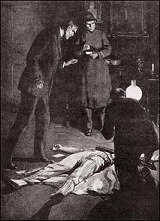In age he was rather younger than Douglas - forty-five at the most - a tall, straight, broad-chested fellow with a clean-shaved, prize-fighter face, thick, strong, black eyebrows, and a pair of masterful black eyes which might, even without the aid of his very capable hands, clear a way for him through a hostile crowd. He neither rode nor shot, but spent his days in wandering round the old village with his pipe in his mouth, or in driving with his host, or in his absence with his hostess, over the beautiful countryside. “An easy-going, free-handed gentleman,” said Ames, the butler. “But, my word! I had rather not be the man that crossed him!” He was cordial and intimate with Douglas, and he was no less friendly with his wife - a friendship which more than once seemed to cause some irritation to the husband, so that even the servants were able to perceive his annoyance. Such was the third person who was one of the family when the catastrophe occurred.
As to the other denizens of the old building, it will suffice out of a large household to mention the prim, respectable, and capable Ames, and Mrs. Allen, a buxom and cheerful person, who relieved the lady of some of her household cares. The other six servants in the house bear no relation to the events of the night of January 6th.
It was at eleven forty-five that the first alarm reached the small local police station, in charge of Sergeant Wilson of the Sussex Constabulary. Cecil Barker, much excited, had rushed up to the door and pealed furiously upon the bell. A terrible tragedy had occurred at the Manor House, and John Douglas had been murdered. That was the breathless burden of his message. He had hurried back to the house, followed within a few minutes by the police sergeant, who arrived at the scene of the crime a little after twelve o’clock, after taking prompt steps to warn the county authorities that something serious was afoot.
On reaching the Manor House, the sergeant had found the drawbridge down, the windows lighted up, and the whole household in a state of wild confusion and alarm. The white-faced servants were huddling together in the hall, with the frightened butler wringing his hands in the doorway. Only Cecil Barker seemed to be master of himself and his emotions; he had opened the door which was nearest to the entrance and he had beckoned to the sergeant to follow him. At that moment there arrived Dr. Wood, a brisk and capable general practitioner from the village. The three men entered the fatal room together, while the horror-stricken butler followed at their heels, closing the door behind him to shut out the terrible scene from the maid servants.

The dead man lay on his back, sprawling with outstretched limbs in the centre of the room. He was clad only in a pink dressing gown, which covered his night clothes. There were carpet slippers on his bare feet. The doctor knelt beside him and held down the hand lamp which had stood on the table. One glance at the victim was enough to show the healer that his presence could be dispensed with. The man had been horribly injured. Lying across his chest was a curious weapon, a shotgun with the barrel sawed off a foot in front of the triggers. It was clear that this had been fired at close range and that he had received the whole charge in the face, blowing his head almost to pieces. The triggers had been wired together, so as to make the simultaneous discharge more destructive.
The country policeman was unnerved and troubled by the tremendous responsibility which had come so suddenly upon him. “We will touch nothing until my superiors arrive,” he said in a hushed voice, staring in horror at the dreadful head.
“Nothing has been touched up to now,” said Cecil Barker. “I’ll answer for that. You see it all exactly as I found it.”